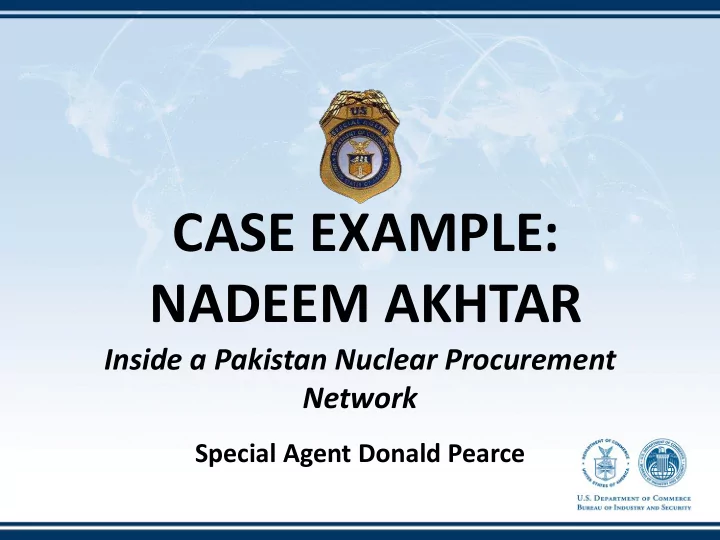

CASE EXAMPLE: NADEEM AKHTAR Inside a Pakistan Nuclear Procurement Network Special Agent Donald Pearce
Pakistan Atomic Energy Commission’s (PAEC) Chashma Nuclear Power Plant Complex Pakistan Space and Upper Atmosphere Research Commission (SUPARCO) - Pakistan’s National Space Agency
THE INITIAL TIP 1995 – U.S. company makes a licensed export of actuators to a commercial nuclear power plant in the PRC. 2007 – same company receives 4 inquiries: - Taiwan rep receives PRC inquiry - 4 months later: Taiwan rep receives 2 nd inquiry, listing part numbers (CNPP- “Any Problem?”) - Domestic phone inquiry the following month - Request from Akhtar, along with an end-use statement showing end use by AES Lapir Thermal Power Station.
COMPUTER COMMUNICATION USA (CC-USA, a/k/a/ CCI-USA)
AKHTAR’S ROLE Received direction as to what commodities to purchase in the U.S. and the methods to be used to conceal the true nature, value and end-use/end- user of the items Negotiated pricing with manufacturers and suppliers Placed orders, arranged shipments, falsified the export paperwork Received a commission of 5%-7.5% of cost
Pakistan National/CEO of Private Pakistan Company Akhtar, doing business in the U.S. as CCI
GENERAL TECHNIQUES Use of third parties and a variety of business entities in Pakistan, Dubai and the U.S. Use of false End-User Statements Falsification of Invoices, Purchase Orders and Air Waybills Deliberate undervaluing to avoid export declaration filing requirements Concealment of controlled items in large shipments
PERSONAL DOSIMETERS • Don’t tell the company the items are destined for Pakistan • It might help to change the “brand” of the items being requested due to the “strict rules” of the manufacturer • Akhtar instructed to buy in batches from different companies using different buyer names • Exported a total of 300 • Utilized a business associate in the Midwest for part of the purchase • Retails for approximately $300 each • 100 digital calculators/$3.50 each • 200 digital pagers/$2.50 each • Exported to third party in Dubai
NUCLEAR GRADE RESINS • Akhtar informed that a license would be required if resins were going to Pakistan • Directed to make another attempt, and to add “a few other non- nuclear resins” in the quote • Akhtar uses the owner of a wireless company to request a quote for end-use in Maryland • Failure to procure will result in “stoppage of the plant” • Akhtar instructed to order portions every few days using “alternate companies” • Trading company in Dubai used to transship the resins • Total commercial cost: $10,000 • Declared value: $850
COAXIAL ATTENUATORS • Initial order delayed because manufacturer required an end-use statement • Akhtar provided with two end-user certificates, indicating items would be used in research project related to “RF applications” • Use whichever certificate you feel is appropriate. • Akhtar uses SUPARCO EUS • U.S. Company fails to identify SUPARCO as a listed entity • Identified in export paperwork as “computer part” • Total commercial cost: $3,000 • Declared value: $90
SELECTOR SWITCHES • Akhtar receives long list of various selector switches • He warns that a long list of parts would raise suspicion that items are destined for an overseas user. Suggests “Next time we break these quote into different segment.” • Purchase order shows domestic sale • Akhtar instructed to export the switches and other items to Dubai • Identified in export paperwork as “spare parts (switches)” • Total commercial cost: $63,250 • Declared value: $450
KNOWLEDGE “Do not mention it is for Pakistan” “Next time we break these quote into different segment” “Difficulties were faced as these stores were for nuclear application” “add a few other non - nuclear items” in the request “since these are…restricted items and have nuclear application…delivery date may cause problems” Because these items are “nuclear accessories…avoid disclosing the user in the best interest of [the] State”
INDICTMENT March 2010 - Akhtar and co-conspirator indicted by a Federal Grand Jury in Baltimore, MD and charged with: – 1 count of conspiracy to violate IEEPA – 7 counts of IEEPA violations – 1 count of money laundering
SENTENCING Akhtar pleaded guilty on September 9, 2011 January 6, 2012 – sentenced to 37 months in prison – Seriousness of offense – Desire to send a message of deterrence
QUESTIONS? Bureau of Industry and Security U.S. Department of Commerce www.bis.doc.gov Where Industry and Security Intersect
Recommend
More recommend